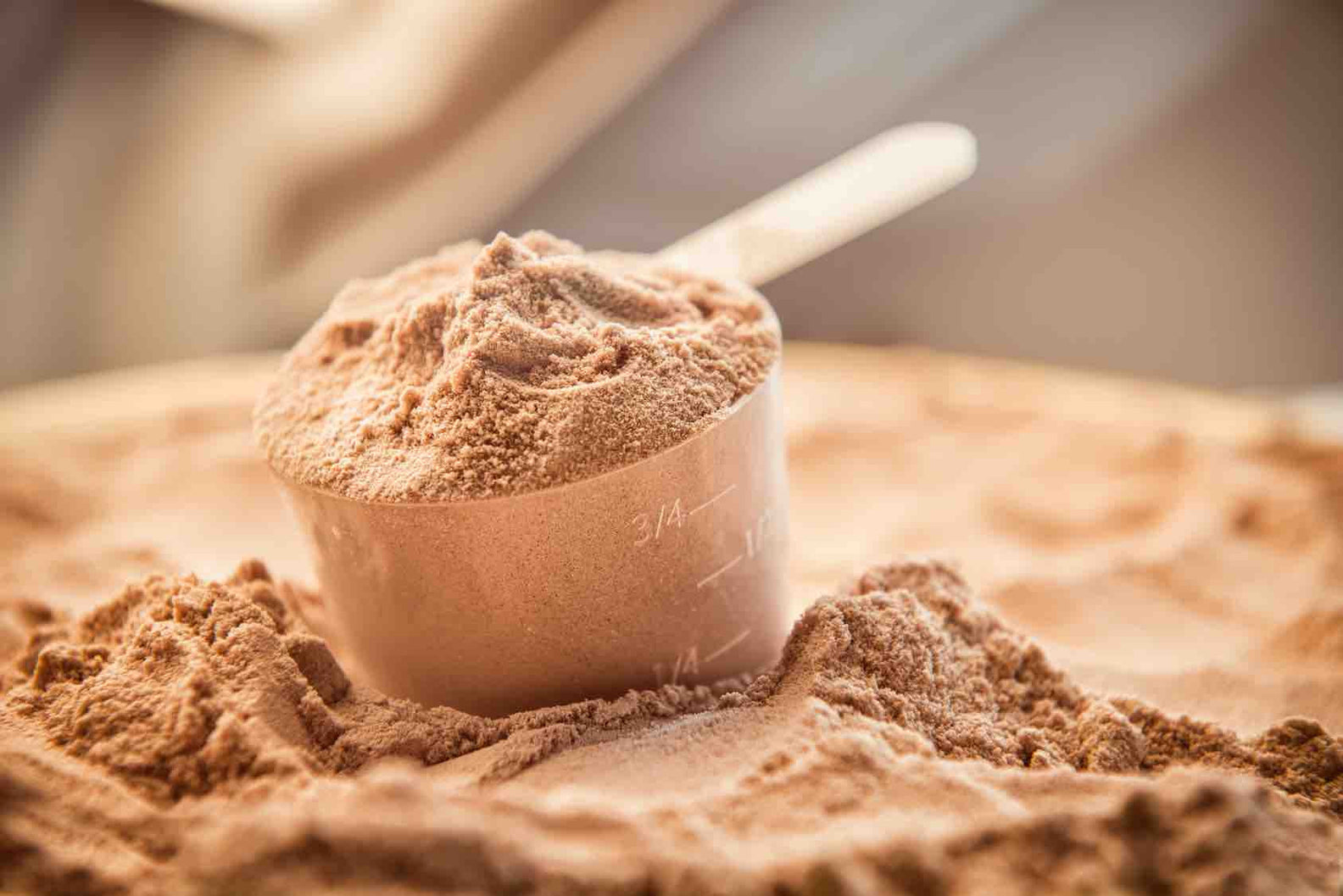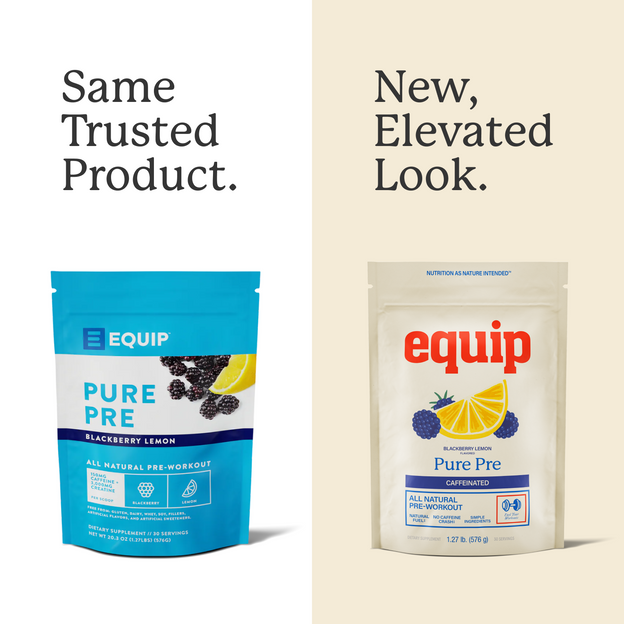Ahh, the beauty of protein powders! The simplicity of taking a scoop of a deliciously flavored powder and mixing it up with your favorite beverage in a matter of seconds for a high dose of protein on the go. Nothing can beat that. There are so many different types of protein powders that make it super convenient for you to up your daily dose of protein in an easy way.
With so many types of protein powder available on the market today you are probably wondering, ‘what’s what and which one is for me? Grab your shaker bottle and let's sample some of the available protein powders out there!
TYPES OF PROTEIN POWDER
Whey concentrate protein
A place where people usually start, whey protein concentrate powder is often the cheapest, most popular and most common form of whey protein available. Whey concentrate is actually a byproduct of cheese production. This particular protein product is used to increase dietary protein intake amongst many types of athletes, bodybuilders and weight loss participants all over the world with the common goal of maximizing muscle hypertrophy, keeping fat at bay and increasing tone.
Whey concentrate powder is rich in essential amino acids but compared to whey isolate powder is the least processed of the whey forms. Concentrate can contain anything from 29 to 89% protein by its weight; with the remaining composition being lactose and a little bit of fat.
If you have any sort of a dairy reaction, whey is not the type of protein you want. It can cause intestinal discomfort, bloating, and gassiness. Also, watch for the fillers that can exacerbate this effect on the ingredient label.
Whey is a type of protein that in general digests fairly quickly, which can be great if you’re drinking mid workout, but otherwise can lead to insulin secretions and possible metabolic problems and weight gain.
Whey Concentrate Benefits: One of the cheaper proteins to buy and can mix very well with water and milk.
Whey Concentrate Side Effects: Isn’t the purest type of protein and can cause intestinal distress if any intolerance to dairy. Contains more carbohydrates than an isolate or soy usually.
Whey Isolate PROTEIN
Whey protein isolate is a further purified version of whey concentrate. Can be used by those who are following a cutting diet plan after hard workouts, however it can digest very quickly, so not great for those on a low carb plan.
Whey isolate is one of the more pricey proteins available, but why? Isolate is the purest form of whey on the market containing the lowest levels fats, essentially you're paying more for less…calories that is. Whey isolates are arguably the quickest absorbed protein powders available. This can be good if you have just worked out, but not ideal if you are trying to lose body fat or taking this as a meal replacement.
Isolate powders, due to being absorbed faster create a more profound insulin response, which is a distinct disadvantage if you are on a weight loss plan and/or calorie deficit. 1 scoop of whey isolate on average, mixed with water is less than 100 calories and contains about 22-25g of protein.
Like the same with whey concentrate, whey isolate is still derived from dairy. This means that if you are at all intolerant to dairy, this type of protein can cause some serious digestive problems.
Whey Isolate Benefits: Great for during a workout.
Whey Isolate Side Effects: Digests very quickly, contains dairy and potentially bad for digestion.
Casein protein
Casein is a dairy-derived protein powder and it’s a slow release protein, which is why many athletes, bodybuilders and fitness fanatics drink a casein shake before bed. When casein is ingested it forms a clot in your stomach, this clot then slows down the rate of gastric emptying, which in turn then slows down the rate at which amino acids from the protein are absorbed into your bloodstream making it perfect for a tapered release overnight.
However, due to this prolonged release, if you are at all sensitive to dairy products, you are going to be hurting for a long period of time. Casein can be good for the right person, but for many people it is not an ideal type of protein. It can cause inflammation and some serious digestive distress.
Casein Benefits: Usually inexpensive, can be useful for night time recovery digestion for the right people.
Casein Side Effts: Isn’t the purest type of protein and can cause intestinal distress if any intolerance to dairy. Texture can sometimes be a little grainier than other whey. Very thick consistency makes it difficult to drink.
Hemp protein
Hemp has been consumed for centuries for its associated health benefits, including the fact that it’s high in protein. Only in recent years however have supplement companies started to extract and concentrate the protein found within this naturally growing herb, as a result we now have a naturally occurring vegan friendly protein source to add to the array of powdered drinks on the market.
There are many benefits to this protein type, and one of the best is the fact that it contains all 9 essential amino acids. This is quite uncommon for a non-meat or dairy based protein source making it a go to option for any vegan health enthusiast. In conjunction with being a whole protein source, hemp protein also contains the essential amino acids 6 and 9 which are vital for proper immune function and cell growth / repair. This really is a very rich nutrient source for anybody wanting to enhance his or her inner functions as well as develop lean muscle tissue.
Hemp also contains carbs and fat, however, making it a challenge for those on a specific type of diet. If you are looking to shed fat or are on a low carb diet, hemp protein is probably not the best for you.
Hemp can also be extremely difficult to mix due to the nature of the plant cell walls. Because of this, the mixture can be very grainy and hard to drink. Manufacturers get around this by adding a bunch of artificial compounds and gums to thicken it up and make it more soluble, which is not good for your health.
Hemp Protein Benefits: Easily digested, vegan source of protein (if that’s what you’re into)
Hemp Protein Side Effects: Mixed reviews on taste and ability to mix, not isolated protein.
Soy Protein
When it comes to types of protein powders for vegans and vegetarian soy is a controversial choice. A good quality soy protein powder will provide you with a complete vegetable protein source, perfect for vegetarians. However, it has been well documented that soy protein could contain phytoestrogens that mess with hormones and create some fairly serious health problems. This includes problems with thyroid and also sex hormone secretion.
People to try to mix up the type of protein sources and choices they intake. Soybeans are a pretty versatile vegetable protein as they contain most of the essential amino acids your body and muscles need for repair and growth making soy, but if you were going to go with a vegetable protein, hemp and even pea would be much better choices.
Soy Protein Benefits: Very cheap in cost, high protein and low in carbs
Soy Protein Side Effects: Findings have concluded that the phytoestrogens contained within soy protein can lead to decreases in testosterone levels and increases in estrogen.
Beef Isolate Protein
Beef isolate protein is a relatively new type of protein powder on the market. Beef protein isolates are usually a popular choice amongst those with a dairy intolerance as the good ones are free from whey, soy and artificial color. An excellent example of one of the purest beef isolates on the market is our clean protein powder - Prime Protein.
Prime Protein consists of 100% grass fed beef isolate protein, which contains collagen, gelatin and all of the micronutrients you would get from eating a 4 ounce cut of grass fed beef. This isn’t cheese production leftovers like whey protein, Prime uses full chunks of grass fed beef.
This beef protein powder is paleo friendly and is the closest you can get to eating a real meal from a supplement. The collagen and gelatin helps you build back joints and connective tissues and the amino acids from the beef help you build muscle tissue rapidly. A recent study just showed the same amino acid spikes as both whey AND casein, meaning you are getting both fast and slow absorption of this protein, just like you would when you would eat a piece of beef.
There is no dairy in beef isolate protein, so those with intolerances to dairy should feel safe knowing they aren’t going to have any inflammation or gut problems. We use beef protein powder in our clean protein bars.
Prime Protein is also low carb and low fat, meaning you can use it specifically for when you need protein, and then add in fats and carbs as you wish.
Beef Protein Benefits: Fat free, low carb, low calorie and high nutritional value, packed with collagen and gelatin, no inflammation or dairy
Beef Protein Side Effects: Not suitable for vegetarians or vegans due to the animal protein.
When it comes to deciding which type of protein powder is for you, it can be tricky with so many excellent choices on the market, ultimately selecting the best quality powder which fits your goals is the best way to go.
We strive to create the best quality protein powder with our Prime Protein so you can reach your goals. Our beef organs and beef liver supplements provide a powerful source micronutrients and our colostrum supplement is amazing for digestion. Combining these powerful and potent supplements will give a boost in health and help you reach your goals.


